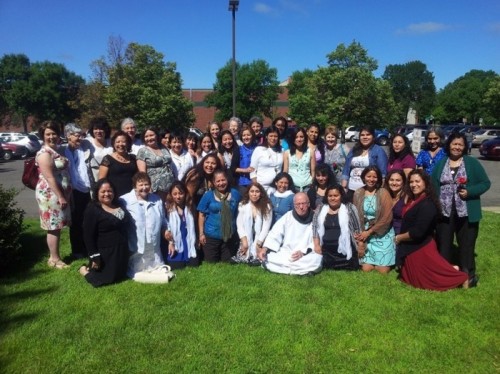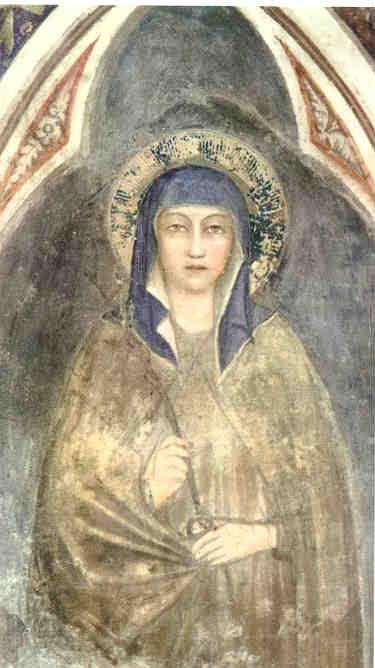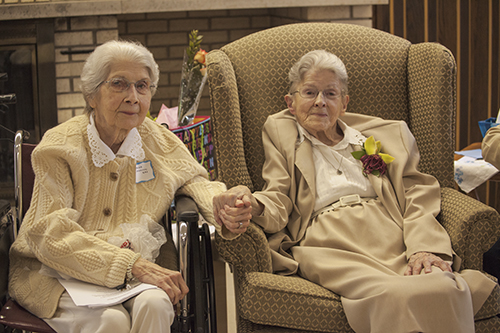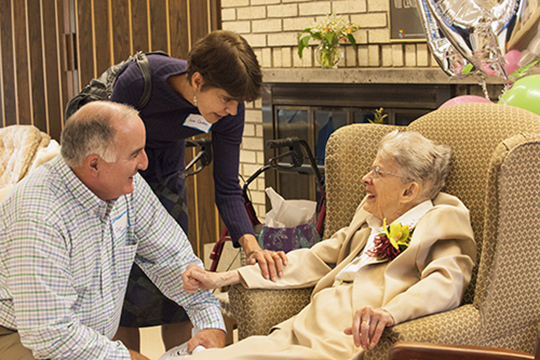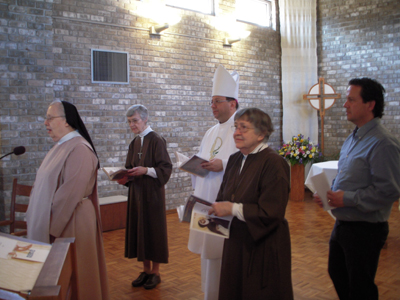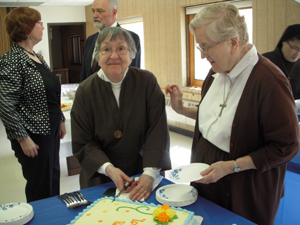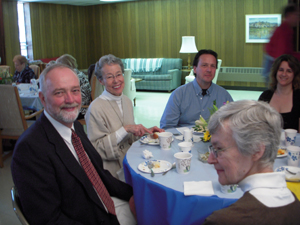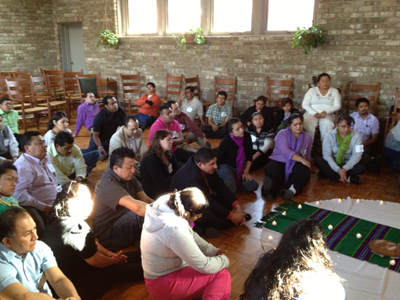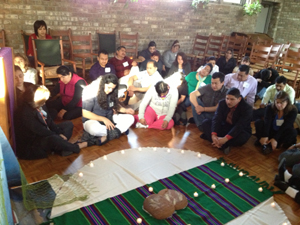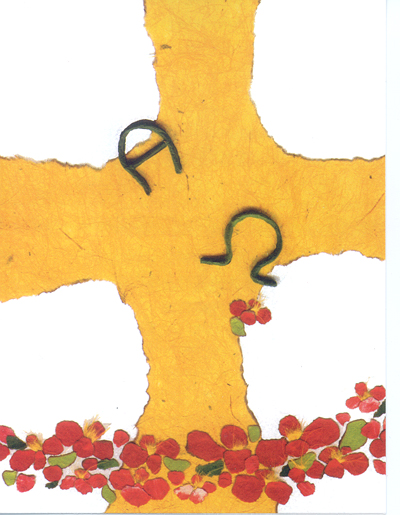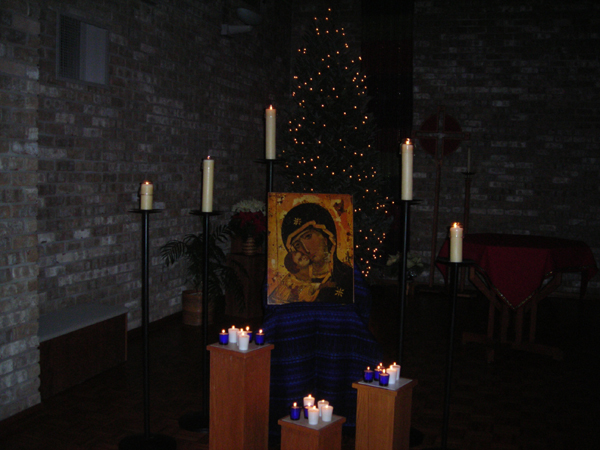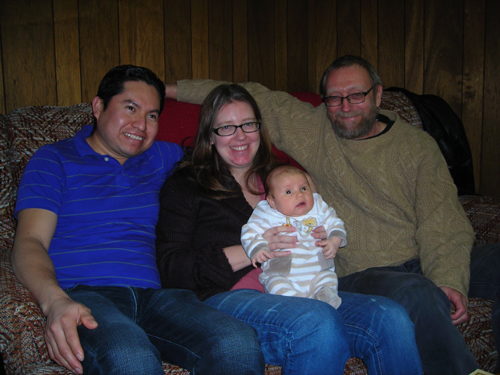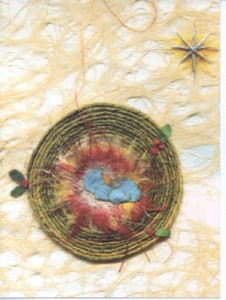ACTS Sisters with Friar Charlie McCarthy
About ACTS:
We first learned about “Acts” from Franciscan padre, Charlie McCarthy, pastor of Assumption Parish near our monastery. The parish has so many programs and groups meeting at their Church that we were asked to host the “Acts” here in our large hospitality area. What a blessing! Each Tuesday from 7 – 9 PM about 20 women meet here and from here Skype their counterpart group in El Paso, Texas, praying, learning and preparing a retreat for other women from Assumption parish who will make the ACTS retreat at PriorLake the end of July.
The name of the group, “Acts is inspired by the Acts of the Apostles 2:42-47.”
The acronym stands for: Adoration, a life centered in Christ; Community, in and with the people of God; Theology, exploring the religious dimension of human experience; and Service, to serve one another in Christ through love, caring and compassion.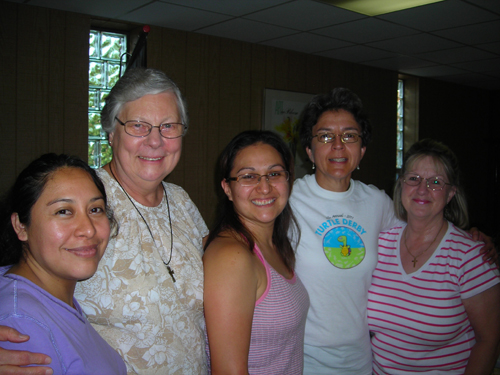
Some of our beautiful Acts women: L to R, Magali, Sr. Noreen, Marielise, Anna Marie, Nancy
Women of the ACTS movement met here in the our hospitality area for 13 consecutive Tuesday evenings preparing a most amazing three day experience for their Catholic sisters in Christian sacramental living with profound love and personal sharing.
Feast of St. Clare
Welcome all Franciscans to the Monastery of St. Clare for the Feast.
The Transitus is at 7:00 PM August 10.
The Eucharist is at 10:00 AM August 11.
INHERITANCE
For Saint Clare
Light is your legacy, Clare,
the light that falls across the day,
new each morning with a constancy
that hints at you.
I see you in the early light
spreading the glow of the high place
from which it came,
pristine on stone and icon,
subtle on wooden floor.
From a fountain beyond time
light streams toward me
down long hallways,
sometimes rosy when the sumac
dyes it on its way.
This is the light that searches every deed for love.
I think of you especially at sunset,
when a golden western light
burns through the quiet trees
and strikes the gleam of life in all the leaves,
making the air between them radiant as fire,
mellow evening fire for this hearth,
this place of peace that blesses night
and welcomes dawn
secure, held in your enduring light
Birthday Celebration in Honor of Sister Anne
On Sunday, June 9 from 2-5 pm, a large group of friends and family of Sister Anne gathered in the Community hospitality room to celebrate her long and fruitful life. 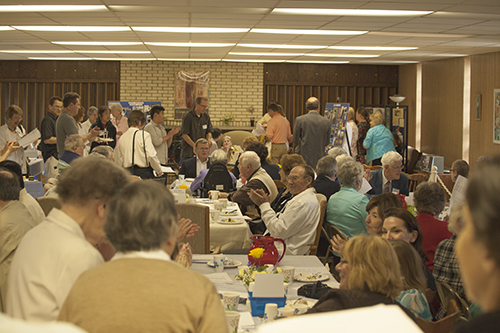
Sr. Anne was born in 1913, raised in St. Paul, educated by the Sisters of St. Joseph and entered the Poor Clare Monastery in Sauk Rapids, MN in 1931. She and a small group of Sisters at the request of Archbishop Burne began a Community of Poor Clares here in Bloomington in 1954. Sister Anne was active in the beginning of the Federation of Poor Clares in the United States and served two terms on the Council. In the 60’s she was instrumental in developing a program for contemplative Sisters at St. Teresa’s College, Winona, Mn. following on the directives of the Second Vatican Council. Sister Anne received a degree in French during her time at the college. Meanwhile Korean Sisters were arriving for formation and some of the Bloomington Sisters were studying Korean preparing for the first Poor Clare foundation in South Korea. Among her many contributions to life and liturgy here at the monastery are her beautiful weavings which grace the walls of our chapel for all the different seasons of the year.
Sister of St. Joseph, Catherine Jenkins, is pictured here with Sister Anne.
Nieces and nephews came as far away as Florida and Alaska to celebrate with Sister Anne.
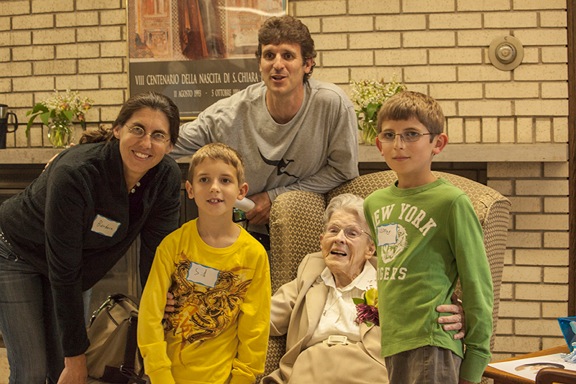 Young and old enjoyed the party.
Young and old enjoyed the party.
Sister Lucie of Jesus: Solemn Profession of her vows to the Lord
In Community here in Bloomington we knew God’s blessing as we celebrated the Solemn Profession of Sister Lucie Lafleur on April 27. Sister Lucie is originally from Quebec where she ministered as a pastoral associate and a member the San Egidio movement with particular outreach to immigrants. The Solemn Profession took place in our Chapel during the Eucharistic Celebration.
Following the Eucharist and ceremony we all walked to the hospitality area for the luncheon prepared by the Sisters.
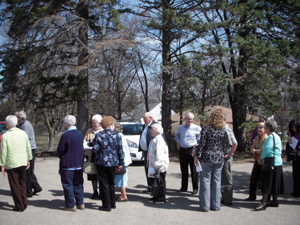
Sister Lucie and Sister Gabriel attended to the ceremonial cake.
Family and friends joined us for a festive meal.
Eric and Brigitte, dear friends of Sister Lucie, came from Quebec.
Papa Francisco
“Our daily problems and worries can wrap us up in ourselves, in sadness and bitterness, and that is where death is,” he said. “Let the risen Jesus enter your life, welcome him as a friend, with trust: he is life!”
Easter, 2013
“Grace and Peace to you from the One who is, who was and is to come.” (The Book of Revelation. 4)
The golden cross on our Easter card reaches out to each and all of you, to the north and south, east and west. The Alpha and Omega, first and last letters of the Greek alphabet, indicate the all inclusive message of hope and good will to all God’s people throughout the world. This message is not sterile but bears leaves and flowers with the promise of fruit already forming beneath the buds.
Our new Franciscan/Jesuit pope urges us not to give in to the daily temptation to bitterness and pessimism but to find new ways of being grace to others and sharing peace with those near and far.
In Community here in Bloomington we know God’s blessingas we celebrate the Solemn Profession of Sister Lucie Lafleur on April 27. Sister Lucie is originally from Quebec where she ministered as a pastoral associate and a member the San Egidio movement with particular outreach to immigrants. Fidelity and fruitfulness come together as we celebrate100 years of life of our Sister Anne Condon, born and raised in Minneapolis, and one of the founders of this Community.
In the celebrations of Holy Week, continuing throughout the Great Fifty Days we remember you all with love and grateful appreciation.
Praying for Peace in this year of 2013.
Our lives are made of days and nights, seasons and years, for we are part of a universe of suns and moons and planets. We mark ends and we make beginnings and, in all, we praise God for the grace and mercy that fill our days.
Let us pray for God’s blessing in this new year.
Remember us, O God;
From age to age be our comforter. You have given us the wonder of time, blessings in days and nights, seasons and years. Bless your children at the turning of the year and fill our months ahead with the bright hope that is ours in the coming of Christ.
You are our God, abiding with us for ever and ever. Amen.
Nativity at 8650 Russell
Please join us for Christmas Eucharist at 10:00 PM Christmas Eve and continue the celebration in our hospitality area following the Eucharist.
“Up from the stump of Jesse.”
The prototype of our Christmas greeting is a two dimensional art piece in the Hanji tradition of ancient Korea. Korea is famous for paper making, utilizing the inner bark of the native Mulberry tree. From this craft of paper making flows the art of pressing and pulling and tearing bits of paper into two and three dimensional forms of exquisite beauty.
The Scriptural inspiration for the card is from the prophet Isaiah: “A shoot will come up from the stump of Jesse, and a branch shall grow out of its roots.” Isaiah: 11: 1.
Jesus is the “shoot” of God’s tree. The tree is the family of God. The root on the card is made of tightly rolled paper in shades of green and brown formed to make the “stump.” The Child, lying in the “nest” of the root, is from the family of Jesse. His destiny is to be born in poverty and suffering. The red color signifies suffering. Gold is the color of glory, and reminds us that Jesus is born to die and to rise from death that we might follow in his footprints. Blue is for purity of vision and of life. Jesus is wrapped in the blue blanket of his person, our true leader and guide. The leaves and berries show life in the fertile root.
The background of the card signifies the Universe, indicated by a variety of paper forms. The stump of Jesse comes out of the seeming chaos of the Universe, God working so carefully over eons of time. The star is leading us where we have to go, and to the One to whom we are called to follow.
Blessed Christmas to all!
“It is beginning to look a lot like Christmas”
